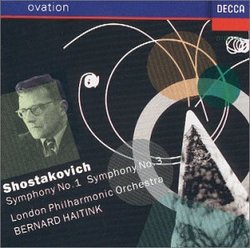EASY IN ONE SENSE
DAVID BRYSON | Glossop Derbyshire England | 07/03/2003
(5 out of 5 stars)
"The easy bit is the rating to give this disc. Belief and commitment, top class playing and choral work and excellent sound make this a routine 5* job. The less easy bit, for me certainly, is what to make of the music. I am in no doubt at all of Shostakovich's significance, and I have got less conservative as I have got older - I like Bartok, I have some Schoenberg and Berg favourites, and I am very keen indeed on Stravinsky, Prokofiev, Britten and Walton. One thing I can say with my hand on my heart about Shostakovich is that he certainly does not bore me. There is no mistaking the power of the inspiration, what I can't make up my mind about is how coherent is this music? Shostakovich is unusually eclectic - I am tempted to say he is sometimes consistent but not always. He can switch abruptly from tonal smoothness to acid dissonance, and from 19th century orchestration (maybe with a bit of piano obbligato) to big-drum effects and tambourine-man-style episodes, although I guess even Nielsen went in for those too. It does not take much knowledge of history to appreciate that the political pressures on him were greater than on his politically-aware and sometimes even politically active predecessors Beethoven, Wagner and Verdi, but I can't see how any assessment of his music can just say that such-and-such of his several styles reflected his situation at such-and-such a time and leave it at that. His music, anyone's music, has to stand on its own feet. These two symphonies are from the 20's, before the big Stalinist foot came down. The first is remarkably assured for an op10, and the slow movement in particular has a lot to say to me even as `absolute' music. #3 ends with a choral paean to the revolutionary glories of 1 May, and at least in English translation the poem is not as bad as it might have been given its theme. It does not descend to the level of Peter Ustinov's spoof theme (obviously with Shostakovich in mind) `Your mother cannot weep for you, she is building a tank'. As I listened to this choral finale, in its relatively traditional idiom, I was impressed by a powerful piece of music which must surely have reflected some sincere identification with the sentiment of the text. I am not ideologically opposed to revolutionary aims (as distinct from how they tend to work out in practice), but I ended having heard some fine music and completely unstirred politically. That's music for me. Bach, Handel, Mozart and Schubert set some of their greatest music to texts that were outright rubbish, and nothing in their life-stories illuminates their music for me in the slightest. Do I have to listen in a different way to Shostakovich?"


 Track Listings (8) - Disc #1
Track Listings (8) - Disc #1